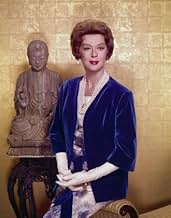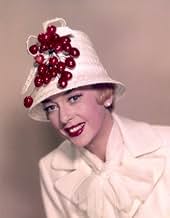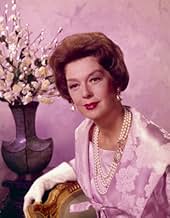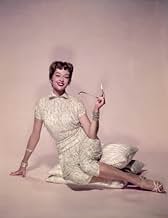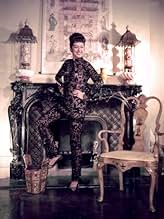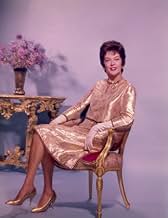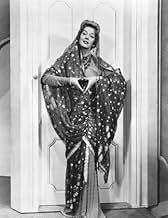CALIFICACIÓN DE IMDb
7.9/10
13 k
TU CALIFICACIÓN
Un huérfano se va a vivir con su tía de espíritu libre. El conflicto surge cuando el albacea de la herencia de su padre se opone al estilo de vida de la tía.Un huérfano se va a vivir con su tía de espíritu libre. El conflicto surge cuando el albacea de la herencia de su padre se opone al estilo de vida de la tía.Un huérfano se va a vivir con su tía de espíritu libre. El conflicto surge cuando el albacea de la herencia de su padre se opone al estilo de vida de la tía.
- Dirección
- Guionistas
- Elenco
- Nominado a 6 premios Óscar
- 5 premios ganados y 12 nominaciones en total
- Dirección
- Guionistas
- Todo el elenco y el equipo
- Producción, taquilla y más en IMDbPro
Opiniones destacadas
St. Iranaeous said it: "The glory of God is man fully alive."
Auntie Mame in her own way lives this life. This may not appear to be a deep movie. But, Mame lives a life that as Agnes Gooch says "I see what she's been living. And I see what I've been missing." She doesn't miss a moment. She's a caricature for so many of the things that go wrong with "growing up" and becoming "mature and responsible". At the end of the day Mame shows the possibilities of a life led to the full. Of a life that is truly vital and alive. This is a movie everyone who wants to leave this world without leaving money on the table should watch and take to heart. Mame is childlike, fun, and living without fear of what others think. This is on my top 10 list.
Auntie Mame in her own way lives this life. This may not appear to be a deep movie. But, Mame lives a life that as Agnes Gooch says "I see what she's been living. And I see what I've been missing." She doesn't miss a moment. She's a caricature for so many of the things that go wrong with "growing up" and becoming "mature and responsible". At the end of the day Mame shows the possibilities of a life led to the full. Of a life that is truly vital and alive. This is a movie everyone who wants to leave this world without leaving money on the table should watch and take to heart. Mame is childlike, fun, and living without fear of what others think. This is on my top 10 list.
From the cartoon kaleidoscope opening to the last walk up the staircase for Mame Dennis, this comically-contrived and highly theatrical movie version of the celebrated Broadway success is nevertheless pleasing in almost every sense. Director Morton DaCosta, who also helmed the stage version, uses the theatricality of the piece to his advantage, giving the proceedings the shiny look and feel of a holiday bauble. The movie takes off running, bursting with chatter and frivolity, and Rosalind Russell is a great crazy-quilt hostess, often going in three directions at once. The story of an orphaned lad in 1928 who goes to live with his batty aunt in New York City started life as a book by Patrick Dennis, with Russell playing the lead once it was turned into a play. The film-version doesn't try to disguise the stage origins, but then it doesn't really have to; DaCosta keeps the pacing so brisk, with characters entering and exiting rapidly, that initially the viewer may feel as though something important may have been missed. The picture isn't loaded down with artificial charm. On the contrary, the romantic sub-plot between Russell and oil tycoon Forrest Tucker (which, again, is quick--in and out) is genuinely sweet (this is Tucker's triumph as much as it is Russell's) and the supporting players are impeccably well-cast, bouncing off each other like frenetic ornaments. While the plot does slip into an episodic structure (and does feel a bit lengthy), the smooth maneuvering of characters and quirks and hang-ups and hang-overs is an awful lot of fun. As for Russell, she gives shading and feeling to this woman; her exuberance can be taken as a put-on (for laughs), yet we never lose sight of Mame Dennis as a ballsy, bright lady, and she never lapses into bitchiness. Mame may have been real, or maybe just a literary confection, but she isn't a phony. She believes life is a banquet, and gets us to believe it too. *** from ****
With a perfect match between character and actress, Rosalind Russell's unforgettable performance as "Auntie Mame" is almost enough to carry the whole movie by itself. The story is also interesting, if quite contrived, and most of the supporting cast helps out when needed. The variety of settings and situations also helps to make the movie an effective portrait of a life.
The story works best when taken as an appreciative but light-hearted portrayal of a memorable character. Many of Mame's adventures are stylized, and they work best when not taken too seriously. Given that, there are plenty of amusing sequences, and just enough thoughtful moments to maintain some balance.
Russell herself is in her element. With a character whom it is almost impossible to overplay, she gives the role plenty of energy and charm. She also works very well with the other characters, giving believable (given the character) and usually interesting reactions to what they say and do.
In the supporting cast, Forrest Tucker and Peggy Cass make good use of their scenes, and Fred Clark works well as Mame's frequent adversary. Coral Browne gets some good moments as Mame's old friend. The filming was approached in a rather stagy fashion, yet much of the time this seems appropriate. All told, the movie has a number of strengths, yet the memory most likely to remain is Russell's portrait of Mame herself.
The story works best when taken as an appreciative but light-hearted portrayal of a memorable character. Many of Mame's adventures are stylized, and they work best when not taken too seriously. Given that, there are plenty of amusing sequences, and just enough thoughtful moments to maintain some balance.
Russell herself is in her element. With a character whom it is almost impossible to overplay, she gives the role plenty of energy and charm. She also works very well with the other characters, giving believable (given the character) and usually interesting reactions to what they say and do.
In the supporting cast, Forrest Tucker and Peggy Cass make good use of their scenes, and Fred Clark works well as Mame's frequent adversary. Coral Browne gets some good moments as Mame's old friend. The filming was approached in a rather stagy fashion, yet much of the time this seems appropriate. All told, the movie has a number of strengths, yet the memory most likely to remain is Russell's portrait of Mame herself.
For many years, "Auntie Mame" was *that* movie the AFI list buff I was couldn't ignore: 94th entry in AFI's Top Laughs and 93th quote: "Life is a banquet and most poor suckers are starving to death", that's all I had to heighten my expectations of a comedy with an inspirational life message, featuring one of these happy-go-lucky and flamboyant characters who'd made better life therapists than experts in the flesh. Now if I can think of better candidates as classic comedies, I admit Rosalind Russell is a spectacle by herself, giving a tremendous and rightfully Oscar-nominated performance.
The film opens with its best gag: the reading of a will made by Mr. Edwin Dennis, a wealthy businessman, putting his sole heir Patrick under the care of his aunt Mame. It starts with straight, sane and sound, reading and then the voice-over goes all hysterical at the mention of the woman's usual shenanigans, to which Edwin insists they shall never interfere with his son's education, with which he entrusted the conservative Dwight Babcock, a trustee of the Knickerbocker Bank. Doubting this will would have any effect in the next years given his healthy condition, Mr. Dennis signs on what will be his penultimate day on Earth. News headlines reveal his death the day after and that made me think: if the film can make me laugh without any characters present, that's quite promising.
The reading is also narratively efficient as it sets up the exuberant personality of Mame Dennis or Auntie Mame and puts the viewer in the right mindset before the plot takes off. Still, there's not much plot in Morton DaCosta film which is a succession of vignette-like episodes spanning 18 years from 1928 to 1946, with only one mention of the 1929 crash and a mere allusion to World War II that the older Patrick Dennis miraculously dodged. But I guess any movie lover from the 2020s would find elements of enjoyment most notably the peculiar but so appealing personality of Auntie Mame, a flamboyant and exuberant spinster who brings a vibrant energy in every scene she in, which means all the film.
Her first scene sets the tone: she's a party-giving socialite, a thrill-seeker with a unique talent to surround herself with the weirdest personalities: a man running a nudist school, an orthodox archbishop, a constantly giggling Japanese butler (Yuki Shimoda) and so and so. But she passes the first test of character when she welcomes the young orphaned Patrick (Jan Dizlmick) with the kind of reassuring warmth and gentleness many of us who had an eccentric aunt can relate to; and while Rosalind Russell, with her unmistakable raspy voice and her larger-than-life personality; provides all the spices that makes the story digestible, the film benefits from strong supporting players like Vera (Coral Browne) a friend who's made a habit of passing out before any party ends and there's the big Fred Clark as the conservative banker and comic-relief antagonist.
Mame's antics might get on some viewers' nerves, this is why one should remember the time of its release, a darling for costume comedy-dramas and stage adaptations (it was the year of "The Cat on a Hot Tin Roof" and "Gigi"). If anything, "Auntie Mame" is an extravaganza trip with a clothesline-plot on which to hang slightly disjointed episodes: Mame being broke after the crash, Mame as an actress, as a toy seller, as a wannabe Southern belle and lousy cavalier in the one action sequence, Mame as the wife of a smitten Southern played by Forrest Tucker, Mame as a globe-trotter, a merry widow etc. Etc.
The story can be regarded as a studio excuse for a superproduction with lavish award-baity costumes and set designs. Indeed, the fashion changes, so does the decoration of the apartment where the living room and the stairs are the most permanent elements, these changes in style (but not in colore) highlight the one unmovable force: Mame. And the conflict comes from the very fact that Patrick changes, becoming a stuffy adult (Roger Smith) since Mame's marriage allowed Babcock to strengthen his influence and push the boy into courting one of these rich vain college girls, Gloria (Joanna Barnes) who's so caricatural you'd wonder what he found in her.
It's a miracle that the film avoids confusion with all the things going on and the inclusion of late characters: Robin Hughes as a writer helping Mame to write an autobiography and an awkward secretary named Agnes Gooch played by Peggy Cass. The film oscillates between some serious and light moments, there is black comedy and attempts at seriousness, but one shouldn't overthink it and consider that it's just a stage turned into a film. The attempts to recreate the Egyptian setting and Indian have the obsolete charms of old silent films, there' even a scene with Paris in the backdrop and you can clearly see the immobile cars. Less than flaws, these are artistic licenses giving the film its theatrical touch, just like this way DaCosta ends each scene with a fade out but leaving a little spotlight on Russell's face.
Indeed this is a film that asks us to embrace the histrionic and joyful spirit of Mame, I doubt this would work as efficiently as Edward Everett Tanner's book, which I haven't read but from the readers' comments, struck me as a real eye-opener and life-changer. At the end, "Auntie Mame" is a product of its time and I guess the best thing it does is reminding of the comedic potential of Rosalind Russell who gives the performance of a lifetime. I just saw her in a "What's My Line" clip from 1953, and it's got to be one of the funniest mystery guest segment sever so she was definitely fit for the role because she can be funny without trying hard, and also genuinely warm and nice.
So there are directors' films, producers' films, "Auntie Mame" is definitely what we can call an actress' film, and her name was Rosalind Russell.
The film opens with its best gag: the reading of a will made by Mr. Edwin Dennis, a wealthy businessman, putting his sole heir Patrick under the care of his aunt Mame. It starts with straight, sane and sound, reading and then the voice-over goes all hysterical at the mention of the woman's usual shenanigans, to which Edwin insists they shall never interfere with his son's education, with which he entrusted the conservative Dwight Babcock, a trustee of the Knickerbocker Bank. Doubting this will would have any effect in the next years given his healthy condition, Mr. Dennis signs on what will be his penultimate day on Earth. News headlines reveal his death the day after and that made me think: if the film can make me laugh without any characters present, that's quite promising.
The reading is also narratively efficient as it sets up the exuberant personality of Mame Dennis or Auntie Mame and puts the viewer in the right mindset before the plot takes off. Still, there's not much plot in Morton DaCosta film which is a succession of vignette-like episodes spanning 18 years from 1928 to 1946, with only one mention of the 1929 crash and a mere allusion to World War II that the older Patrick Dennis miraculously dodged. But I guess any movie lover from the 2020s would find elements of enjoyment most notably the peculiar but so appealing personality of Auntie Mame, a flamboyant and exuberant spinster who brings a vibrant energy in every scene she in, which means all the film.
Her first scene sets the tone: she's a party-giving socialite, a thrill-seeker with a unique talent to surround herself with the weirdest personalities: a man running a nudist school, an orthodox archbishop, a constantly giggling Japanese butler (Yuki Shimoda) and so and so. But she passes the first test of character when she welcomes the young orphaned Patrick (Jan Dizlmick) with the kind of reassuring warmth and gentleness many of us who had an eccentric aunt can relate to; and while Rosalind Russell, with her unmistakable raspy voice and her larger-than-life personality; provides all the spices that makes the story digestible, the film benefits from strong supporting players like Vera (Coral Browne) a friend who's made a habit of passing out before any party ends and there's the big Fred Clark as the conservative banker and comic-relief antagonist.
Mame's antics might get on some viewers' nerves, this is why one should remember the time of its release, a darling for costume comedy-dramas and stage adaptations (it was the year of "The Cat on a Hot Tin Roof" and "Gigi"). If anything, "Auntie Mame" is an extravaganza trip with a clothesline-plot on which to hang slightly disjointed episodes: Mame being broke after the crash, Mame as an actress, as a toy seller, as a wannabe Southern belle and lousy cavalier in the one action sequence, Mame as the wife of a smitten Southern played by Forrest Tucker, Mame as a globe-trotter, a merry widow etc. Etc.
The story can be regarded as a studio excuse for a superproduction with lavish award-baity costumes and set designs. Indeed, the fashion changes, so does the decoration of the apartment where the living room and the stairs are the most permanent elements, these changes in style (but not in colore) highlight the one unmovable force: Mame. And the conflict comes from the very fact that Patrick changes, becoming a stuffy adult (Roger Smith) since Mame's marriage allowed Babcock to strengthen his influence and push the boy into courting one of these rich vain college girls, Gloria (Joanna Barnes) who's so caricatural you'd wonder what he found in her.
It's a miracle that the film avoids confusion with all the things going on and the inclusion of late characters: Robin Hughes as a writer helping Mame to write an autobiography and an awkward secretary named Agnes Gooch played by Peggy Cass. The film oscillates between some serious and light moments, there is black comedy and attempts at seriousness, but one shouldn't overthink it and consider that it's just a stage turned into a film. The attempts to recreate the Egyptian setting and Indian have the obsolete charms of old silent films, there' even a scene with Paris in the backdrop and you can clearly see the immobile cars. Less than flaws, these are artistic licenses giving the film its theatrical touch, just like this way DaCosta ends each scene with a fade out but leaving a little spotlight on Russell's face.
Indeed this is a film that asks us to embrace the histrionic and joyful spirit of Mame, I doubt this would work as efficiently as Edward Everett Tanner's book, which I haven't read but from the readers' comments, struck me as a real eye-opener and life-changer. At the end, "Auntie Mame" is a product of its time and I guess the best thing it does is reminding of the comedic potential of Rosalind Russell who gives the performance of a lifetime. I just saw her in a "What's My Line" clip from 1953, and it's got to be one of the funniest mystery guest segment sever so she was definitely fit for the role because she can be funny without trying hard, and also genuinely warm and nice.
So there are directors' films, producers' films, "Auntie Mame" is definitely what we can call an actress' film, and her name was Rosalind Russell.
"Auntie Mame" is a comedy for all time. It was released in 1958, and it remains a cinematic treasure for all to enjoy. Rosalind Russell gives the performance of her lifetime. She remains quick and witty throughout the film as Mame Dennis, the delightfully funny aunt of Patrick Dennis whose deceased father puts her in charge of his life. The author, also by the name of Patrick Dennis, deserves kudos for this excellent film adaptation. One of the more memorable characters, Agnes Gouch, played by Peggy Cass, provides the audience with comic antics that make you chuckle for days after viewing this picture. It is a perfectly delightful comedy that must be in the serious collector's film library. Don't miss it.
¿Sabías que…?
- TriviaRosalind Russell broke her ankle in the first take of the scene where she comes flying down the stairs in the gown with the capri pants and shooting had to be delayed until she recovered.
- ErroresIn 1929 Mame and Lindsey talk about what Dr. Spock has to say on child rearing, a decade before his famous book was published.
- Citas
Mame Dennis: Oh, Agnes, where is your spine? Here you've been taking my dictation for weeks and you don't get the message of my book. Live, that's the message!
Agnes Gooch: Live?
Mame Dennis: Yes! Life is a banquet and most poor suckers are starving to death!
- ConexionesFeatured in AFI's 100 Years... 100 Laughs: America's Funniest Movies (2000)
Selecciones populares
Inicia sesión para calificar y agrega a la lista de videos para obtener recomendaciones personalizadas
- How long is Auntie Mame?Con tecnología de Alexa
Detalles
- Fecha de lanzamiento
- País de origen
- Idiomas
- También se conoce como
- Auntie Mame
- Locaciones de filmación
- Productora
- Ver más créditos de la compañía en IMDbPro
Taquilla
- Presupuesto
- USD 2,240,000 (estimado)
- Tiempo de ejecución
- 2h 23min(143 min)
- Relación de aspecto
- 2.35 : 1
Contribuir a esta página
Sugiere una edición o agrega el contenido que falta


